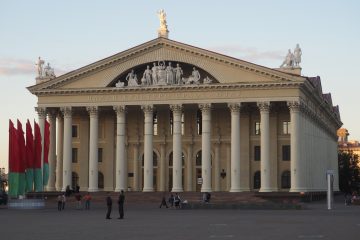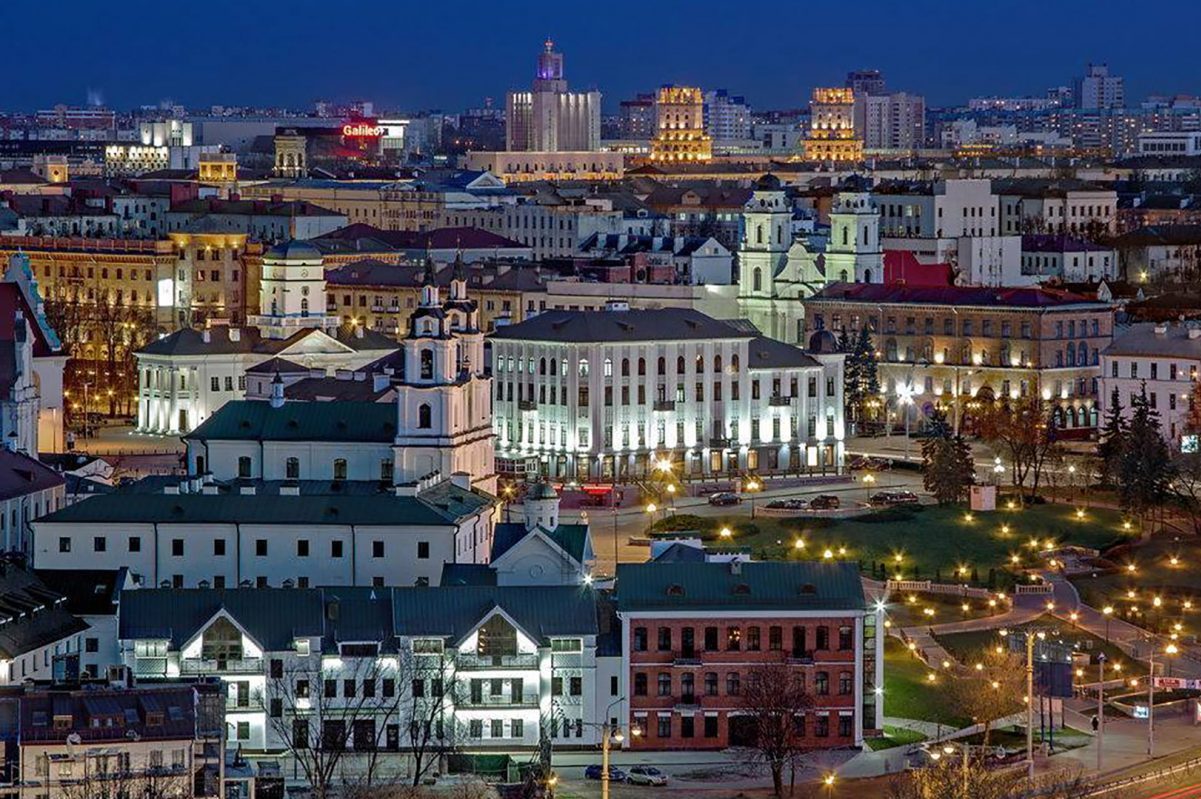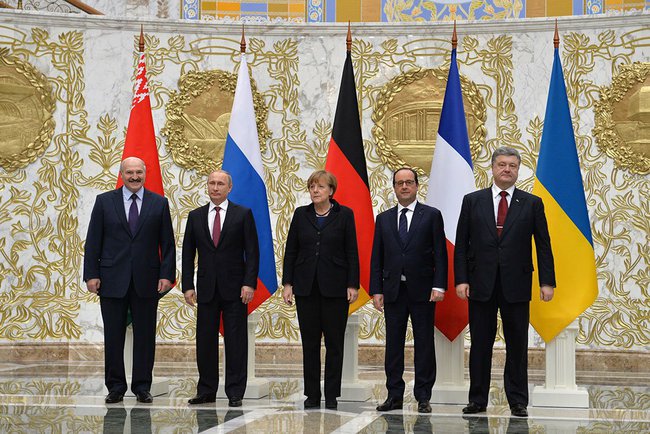2018-2019 Strategy Paper
While preserving his power-politics prerogatives, Alexander Lukashenka, the president of Belarus since 1994, has steered a foreign policy course intended to maintain the country’s national autonomy despite its economic dependency on Moscow and made it possible for the nearly ten million-strong population to secure a livelihood through independent economic activity in Belarus and abroad. Due to its dwindling economic options, the Belarusian state is no longer in a position to fulfil its aim of guaranteeing the standard of living of its citizens (housing, education, healthcare, pension scheme) on the basis of a state-controlled economy. Approximately one million Belarusians work in Russia, and another million work in other countries.
After suffering enormous destruction and heavy losses in human lives during World War II, Belarus was rebuilt, with great effort. Immigration from other parts of the Soviet Union was supported. In addition to directorates of the armed forces, Belarus became the home primarily of industries associated with modern military equipment and machine construction (construction machines, tractors, busses) as well as numerous institutions of higher education, including many specialising in technical fields. In the 1970s, Riga, Tbilisi and Minsk were considered privileged cities of the Soviet Empire, alongside Moscow and Leningrad. In the late 1980s however, the country revealed that it also had an independent, Belarusian independence movement – one harking back to the national independence movement after the end of World War I – in the form of the “Renaissance” movement under the archaeologist Zianon Pazniak, which had over a million followers in the Gorbachev years (1985–1990) and later developed into the Belarusian National Front, or BNF.
The 25th of March, 2018, was a special date in this respect, marking as it did the 100th anniversary of the birth after the end of World War I of the Belarusian People’s Republic (BNR) and thus of an independent Belarusian state, albeit one that existed for less than a year. Normally, the 25th of March is a day on which the Belarusian opposition, which sees Belarus as deeply rooted in European history, and the Lukashenka regime, which sees victory in the Great Patriotic War and the Soviet period as the source of the country’s historical legitimacy, stand in grim opposition. In 2018, however, the commemoration was sanctioned by the state, and was even permitted to include a concert in the park next to the Minsk[AB1] opera house. More than 18,000 people attended the event, at which one could wave the white-red-white flag, insignia of the democratic opposition, with impunity. In conjunction with the anniversary, tut.by, the independent online news portal, published a series of articles in Russian about the BPR, describing, for instance, its political leadership, its borders and the origins of the flag and coat of arms.
Although the organisers and some participants at a nearby, non-authorized parallel event were arrested and temporarily detained, the atmosphere at the main demonstration on the 25th of March was relaxed and harmonious to a degree not seen since before Lukashenka first took power. Thus, in 2018 an occasion usually associated with public protest and confrontation become a celebration. Even the state television channels refrained from disparaging coverage.
This event is exemplary of the fact that Belarusians’ view of their national history is extending beyond the state’s roots in the Great Patriotic War – to include the country’s political, cultural and social ties with Lithuania and Poland, which were severed and abandoned in favour of incorporation into tsarist Russia in connection with the Third Partition of Poland in 1795. The narrative of Belarusian history is changing – but this remains irrelevant for the ossified political culture of the country under Lukashenka.
As a side note, it is worth mentioning the sharp criticism in Russian social networks about the absence of measures to discourage a demonstration commemorating a Belarusian state that was independent of Russia.
A series of other events in 2018 point to tensions in the system of government:
The Russian and Ukrainian media took the cancellation of a planned trip to Gomel in late July as an occasion to speculate about the possibility that Lukashenka had an incurable disease. Although Lukashenka himself refuted the rumours just a few days later, they were enough to launch a broader discussion about the political future of the country. “Is Belarus ready for life after Lukashenka,” was the title of one debate on Radio Liberty. Multiple voices pointed out the acute and persistent threat inherent in having a political system that is tailored to an extreme degree to a single leader, has been infiltrated by numerous Russian agents and whose political elite is characterised by an extremely weak sense of national identity.
There are, in fact, more than a few people in Belarus who advocate a return to Russian rule. Putin has many supporters in the country – particularly as the standard of living is rising faster in Russia than it is in Belarus.
Lukashenka ordered a fairly major government reshuffle in mid-August, which involved the dismissal of the prime minister and four other ministers for failing to carry out their duties efficiently and allegedly failing to carry out the instructions of the President. Syarhey Rumas, then the head of the Development Bank of the Republic of Belarus, was named prime minster.
Government reshuffles occur every four years or so in Belarus. Among other things, they serve to strengthen the president’s position in the eyes of the public, emphasizing his ability to take strong action. Rumas, the new prime minister, has a reputation as an effective manager. But though his appointment may mean that we can expect greater efficiency in the Government’s activities, it is unlikely to bring more profound political or social reform. Rumas is seen as an economics expert and advocate of moderate economic liberalisation. In the private sector there are hopes that he will bring about improvements in the policy framework for private sector activity. Rumas faces the challenge of stimulating economic growth in Belarus despite the tense relations with Russia. First and foremost, the imminent overhaul of the tax system in the Russia’s oil sector, which will result in significant increases in the price Belarus pays for Russian oil, is a likely source of headaches in the months to come. In this context it should also be noted that Lukashenka also dismissed Uladzimir Siemashka, the person responsible for negotiating with Russia in the energy field for the previous 15 years, in the government reshuffle.
Moreover, Rumas will also have to continue the talks with the International Monetary Fund (IMF) about an urgently needed loan to refinance Belarus’ foreign debt. The IMF’s desire for reforms is continually being debated in these talks, without the cooperation with the IMF giving rise to any enduring effects on the country’s economy or finances. Lukashenka himself has emphasized the volatility of the situation and the necessity for faster progress on the economic front: “We won’t be able to maintain our independence if we ruin the economy.”
This danger is now embodied in the form of recently appointed Russian ambassador to Belarus: Mikhail Babich, a former KGB officer who has previously served as Moscow’s representative in Chechnya and in the southern Volga region. Putin originally wanted to send him as ambassador to Kiev, but Ukraine rejected the appointment. In an appearance on Belarusian television in late October, Babich explained that Russia would view any attack on Belarus as an attack on its own country. This has to be understood in a broader context, one that includes the discussion about establishing a NATO missile defence base in Poland. One possible interpretation of this assurance is that Russia is going to insist on opening a military base in Belarus, a Russian desire that Lukashenko has been resisting for years. It appears likely that the Kremlin will tie the provision of additional economic assistance to the demand for a military base in Belarus. There is also speculation that Russian intends to use such a base as the starting point for the forced incorporation of Belarus into the Russian Federation. Opposition politician Mikalai Statkevich believes the preparations for an operation of this kind have already entered their final phase: in a late-September post on his Facebook page he wrote that it would only be a matter of months before Belarus was annexed by Russia.
In domestic policy terms, the tense situation between Russia and the West means that the efficiency of the police state has lost none of its importance for the regime: 18 journalists, for the most part from the prestigious news portal tut.by, were arrested and temporarily detained in early August. The editorial offices of tut.by were searched, as were the personal flats of some journalists. The stated reason for these repressive actions against the independent press was that the journalists had hacked the website of Belta, the state news agency, and used information obtained there without paying Belta a usage fee. The accusation seems absurd, since very few independent journalists, let alone tut.by reporters, use Belta as a source of news. With 89 million visitors to its internet site per month, tut.by is the most widely read online medium in Belarus whereas only 4.6 million readers visit the Belta internet site each month.
The increase in official contacts with the European Union and with individual EU member states in 2018 reflects the country’s interests but cannot be taken as an indication of a substantial West-ward orientation.
Accordingly, no concrete progress in Belarus–EU relations in 2018 can be reported. The EU-Belarus coordination group, established in 2016, met for its biannual sessions in 2018, but without any tangible results. Belarusian parliamentarians continued to be barred from taking part in the Euronest Parliamentary Assembly, a forum with delegations from the European Parliament of the parliaments of countries participating in the EU’s Eastern Partnership initiative.
Given that the sanctions laid by the European institutions and the USA after Lukashenka’s coup d’état in November of 1996 are still in place, including the suspension of the process for ratification of the Partnership and Cooperation Agreement between the European Union and Belarus, the potential for the development of economic relations continues to be limited. No less significant in this respect is the negative attitude towards foreign business investment in Belarusian economic policy, which emphasises state planning and control. The conditions for such investment created by the government are not attractive.
With regard to the talks on the possibility of a visa-free regime for Belarusian nationals for the Schengen Area or at least a reduction of visa fees, the EU has been accused of placing higher hurdles in the path of Belarus than it did in the case of Russia, Azerbaijan or Armenia. The explanation offered by the head of the EU’s delegation to Minsk, that times had changed, is not particularly persuasive. In connection with this, Yury Zisser, founder and owner of tut.by, said that had the EU genuinely wanted to see a democratic Belarus, in practice rather in speeches or on paper, Belarusians would long since have been enjoying visa-free travel to Europe. In contrast to European Union policies, Belarus now permits visitors from all European and several other countries to travel to the country for 21 days without requiring a visa as long as they enter the country via the international airport in Minsk.
The first reactor at the nuclear power plant built in Ostrovets in cooperation with Russia is scheduled to come online in 2019, with the second reactor to follow in 2020. Together, the two reactors will have a generating capacity of 2400 MW. The loans for building these nuclear reactors, which will cost about 11 billion US dollars, are provided by Russia and/or the Eurasian Economic Union.
In light of the 1986 Chernobyl disaster, there are concerns among the population about the possibility of a nuclear accident.
The power plant will have a great impact on the country’s economy, and the country’s financial dependency on Russia will take on a new dimension as a result.
The significance of natural gas in the energy supply and for the country’s economy is decreasing. Whether electricity from the nuclear reactors can be offered under more attractive terms depends on price trends in the oil and natural gas sector as well as on how much financing the reactor will cost. It remains unclear whether Belarus can succeed at becoming an electricity exporting country. Belarus is not currently part of the Energy Community, the international organisation set up by the EU and a number of other countries to establish a common energy market.
After some years of preparation, a memorial complex entitled “Path of the Dead” (Doroga smerti) was ceremoniously opened in the forest of Blagovshchina in Trostinets – a region near Minsk – on 29 June 2018, with the Belarusian, German and Austrian presidents in attendance. The memorial complex is dedicated to the Jews from Germany and Austria murdered in the forest as well as to Soviet citizens murdered in the area. A travelling German-Russian exhibition “Vernichtungsort Malyj Trostinez“ (Maly Trostenets Extermination Camp) has been shown. Several events focussing on reappraising and reflecting on the past and promoting future-oriented understanding between the populations of Germany and Belarus take place within the framework of the Geschichtswerkstatt (“history workshop”), which formed in Minsk several years ago.
The impressive architecture of present-day Minsk, the Belarusian capital, now stands in diametric opposition to the economic and intellectual stagnation characterising the country’s political system. Successfully hosting international championships or the annual session of the OSCE Parliamentary Assembly can do nothing to alter this. Such events are just events, with no profound or long-term impacts.
Observers cannot help but notice that Belarus has ossified in late-Soviet statehood, and there is an intention to perpetuate this condition beyond the period of the current president by securing his son’s succession to the presidency.
Meanwhile, there is independent life in society, which is tolerated as long as it remains below the level of political activity, and here there is a potential for performance and action developing that may one day open a pathway to power.
Recommendations:
In light of the social and economic developments in Belarus in 2018 described above, we wish to highlight the following points as worthy of acting upon:
- Lifting visa restrictions: The EU should show the people of Belarus that they are welcome in Europe by expediting the introduction of visa-free travel and, in this way, actively contribute to a further opening of Belarusian society. The introduction of visa-free travel regimes for Ukrainians, Georgians, and Moldovans in recent years has resulted in a sustained increase in respect for the EU in those countries.
- SME promotion: The government programme to promote the SME sector in Belarus announced by the Belarusian Government in August of 2018 should comprise specific steps and deadlines for implementation, with the latter reflecting insights from Western experiences with SME promotion. A stronger SME sector would result in greater capacity for innovation in the Belarusian economy and reduce dependency on Russia or China.
- Supporting critical voices: Organisations and individuals independent or critical of the regime continue to come under pressure and face difficulty gaining a hearing in society in Belarus. They are still dependent on support from the West. As they also constitute social capital that will be important for the post-authoritarian period in Belarus, the EU should continue to offer programmes that support critical journalists, activists, members of the opposition, analysts, researchers, NGO representatives and creative artists.
- Awareness of the threat to Belarusian independence: The Russian Federation’s destructive and aggressive policies in Eastern Europe are generating increasing fears about a danger to Belarus’ independence, for instance, should the country decide to intensify its relations with the EU. European decision-makers should be aware not only of this acute and persisting threat but also of the value and the significance that Belarusian independence has for Europe, and they should express this publicly. Nonetheless, the aim of strengthening the relationship should continue to be pursued as long as doing so strengthens democracy and human rights in Belarus and expands the scope to develop potential freely in society.
Berlin, January 2019
Hans-Georg Wieck
Chair
Stefanie Schiffer
Deputy Chair
Christoph Becker
Treasurer
Stephan Malerius
Advisory Member


